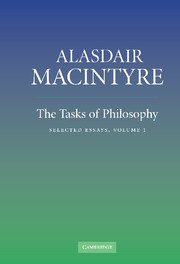Book contents
- Frontmatter
- Contents
- Preface
- Acknowledgments
- PART I DEFINING A PHILOSOPHICAL STANCE
- PART II THE ENDS OF PHILOSOPHICAL ENQUIRY
- 7 The ends of life, the ends of philosophical writing
- 8 First principles, final ends, and contemporary philosophical issues
- 9 Philosophy recalled to its tasks: a Thomistic reading of Fides et Ratio
- 10 Truth as a good: a reflection on Fides et Ratio
- Index
10 - Truth as a good: a reflection on Fides et Ratio
Published online by Cambridge University Press: 05 June 2012
- Frontmatter
- Contents
- Preface
- Acknowledgments
- PART I DEFINING A PHILOSOPHICAL STANCE
- PART II THE ENDS OF PHILOSOPHICAL ENQUIRY
- 7 The ends of life, the ends of philosophical writing
- 8 First principles, final ends, and contemporary philosophical issues
- 9 Philosophy recalled to its tasks: a Thomistic reading of Fides et Ratio
- 10 Truth as a good: a reflection on Fides et Ratio
- Index
Summary
In the encyclical Fides et Ratio John Paul II remarks that he will be “concentrating on the theme of truth itself” and the argument of the encyclical returns recurrently to questions about truth and about the place of a concern for truth in human life. These questions presuppose that truth is a good and indeed the good of the human intellect. And it is with this presupposition that I shall be most concerned, noting that Fides et Ratio not only is an encyclical about philosophy, as was Aeterni Patris, but is also, as Aeterni Patris was not, itself a contribution to philosophy, inviting philosophical scrutiny of its arguments and assertions in a way that is rare, perhaps unique, among encyclicals. It does so just because the questions which are central to it are in part philosophical questions and the encyclical insists that in pursuing them “philosophy must remain faithful to its own principles and methods” . “A philosophy which did not proceed in the light of reason according to its own principles and methods would serve little purpose” .
So philosophy is to be accorded an inviolable autonomy within the sphere of its own enquiries. And the teaching church recognizes the possibility of alternative and rival philosophical approaches in the exercise of this autonomy. Yet at the same time the truths of faith presuppose the truth of some particular philosophical theses and the falsity of others.
- Type
- Chapter
- Information
- The Tasks of PhilosophySelected Essays, pp. 197 - 215Publisher: Cambridge University PressPrint publication year: 2006

